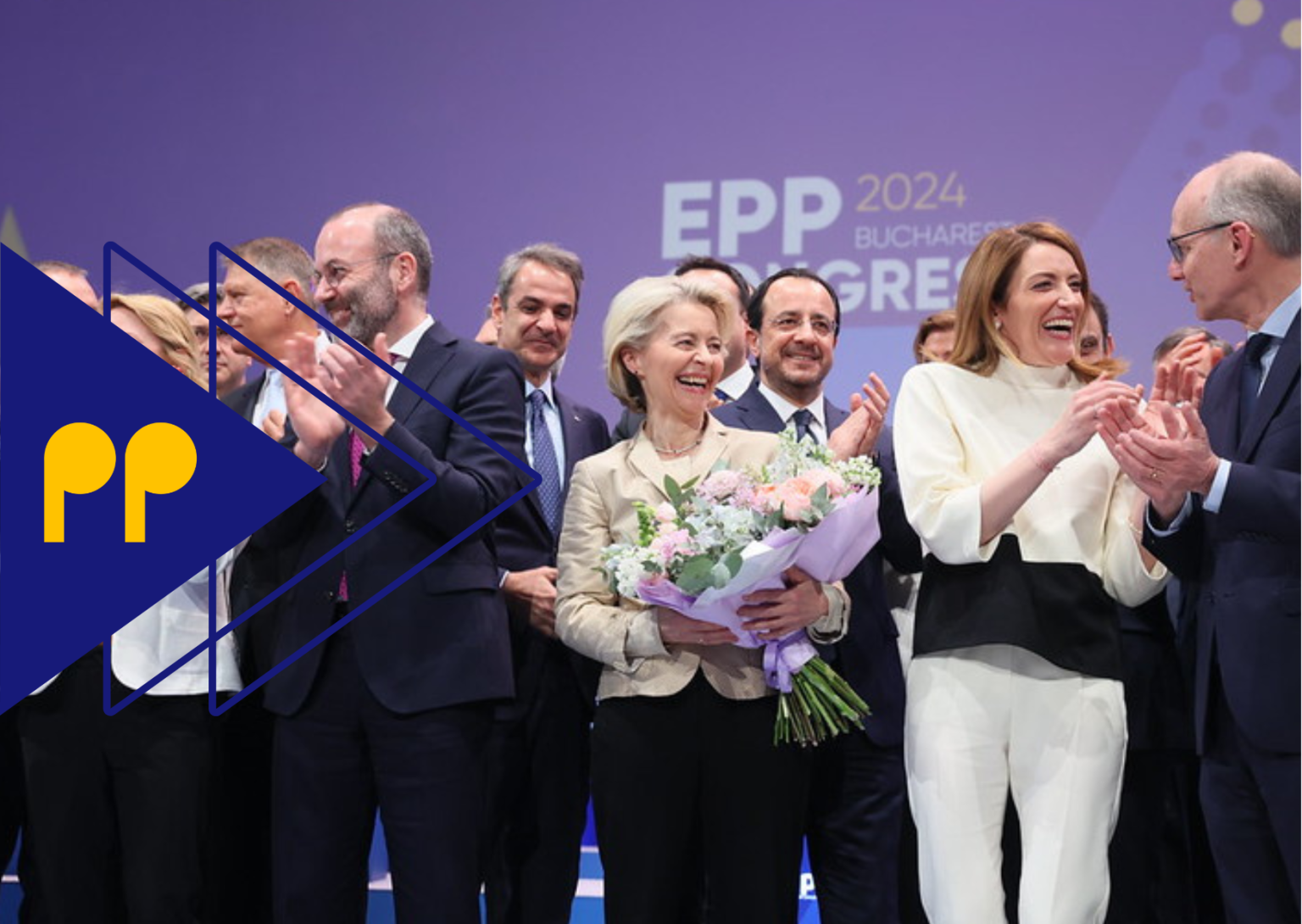PartyParty Attends is our signature series where we immerse ourselves in the political arena’s most dynamic discussions. We bring you the backroom talk from political professionals throughout Europe as if you were sitting in the front row of these events.
Under dreary skies draped in the signature post-communist grey that often shrouds Eastern European cities, Bucharest defied convention by embracing blue as its dominant shade for two consecutive days, hosting the 2024 European People’s Party Congress on March 6 and 7.
As the strongest force in the European Parliament for 25 consecutive years, currently holding more than half of the top EU jobs and leading in all opinion polls, the EPP is well aware of its political hegemony, repeatedly declaring that “It is once again time to lead”. In his opening speech, Manfred Weber, the president of the EPP, fired up delegates with an empowering remark: “Dear friends – we are strong, and we can be proud about this.”
The challenge for Europe’s dominant political family was how to project stability and reassurance without appearing smug and arrogant. We offer an exclusive insider’s look into how the foremost European political party is preparing its campaign strategy ahead of the upcoming Parliamentary elections in June.
The EPP election agenda
The agenda for the EPP’s election congress was clear-cut: on the first day, the party would present and adopt its manifesto, while the spotlight on the second day would be on anointing its unopposed Spitzenkandidatin for the next mandate of European Commission leadership. Having to vote on both proposals, the congress made the most of the venue by arranging the seating in a plenary setup. The informal circular ROMEXPO concert venue was transformed into a parliamentary assembly, framing the congress as providing a 360-degree view of global events and politics, and elaborating on the organisation’s vision for the future landscape of the EU.
Key strategy: secure, preserve & unite
The congress began with the statement that “Europe is its people, and people are at the core of the EPP.” The party defined its mission as to empower Europe and its citizens while providing steadfast leadership in a world of uncertainties. Indeed, the draft manifesto addressed numerous security concerns, ranging from geopolitical threats, such as Russia’s war on Ukraine, to issues of the economy, health, immigration, sustainability and gender; even addressing topics such as bullying in schools.
“In times of change, Europe has your back” – Ursula Von der Leyen
From its core formulation, the party focused on delivering certainty and continuity as its strategy in an attempt to counter the political appeal of more nationalistic and Eurosceptical right-wing parties, depicted as the main threat to democracy. Critics argue that the EPP has drifted to the right in its manifesto, partly due to the necessity for EPP parties in several countries to form coalitions with such hard right parties. The strategy also aims to win back voter groups such as farmers and lower middle-class suburbanites drawn to the extremist narrative, persuading them to opt for a conservative yet moderate political vision instead.
While sticking to the policies adopted or proposed during Von der Leyen’s current mandate (from enlargement to the Green Deal), the manifesto calls for a stronger EU defence effort, with a dedicated Commissioner for defence. But apart from such minor adjustments to EU institutions and complaints about bureaucracy, it contains no significant political innovation.
At the end of day one, the manifesto was unanimously approved. You can read the full document here. The next milestone was to elect the party’s Spitzenkandidatin on day two. Her coronation was preceded by a star-studded build-up, paying homage to Ursula von der Leyen for her first term and nominating her as the leading candidate for another mandate as European Commission president.
While acknowledging and vowing to address voters’ everyday concerns, Von der Leyen framed the choice as between strengthening or dismantling the EU, and between supporting or abandoning Ukraine.
”Let there be no doubt what’s at stake in this election,” she declared. “Our peaceful and united Europe is being challenged like never before by populists, nationalists, and demagogues. Whether it is the far right or the far left. Whether it is the AfD, the Rassemblement National, the Konfederacja or Wasraschdene. The names may be different, but the goal is the same: They want to trample on our values, and they want to destroy our Europe. But we, the EPP, will never let that happen. So this is a defining moment. The signal of Bucharest today is – that EPP is standing for Europe, strong and secure, peaceful and prosperous, democratic and united. We stand pro-EU, pro-Ukraine, pro-rule of law…”
The voting session commenced immediately after her speech, with key European leaders, including Polish Prime Minister Donald Tusk, expressing direct support for her nomination. Out of the 499 votes cast, an overwhelming 400 were in favour of von der Leyen’s candidacy, with 10 votes declared void, while 89 votes were cast against her by delegates, notably from France, who contend that she is too green and not conservative enough
Her nomination as the EPP’s leading candidate was never in doubt. Moreover, leaders also urged the current EP President Roberta Metsola to seek a new mandate, which has only happened once in the history of the EU legislature. Despite projecting confidence, the EPP gathering in Romania amounted to little more than a spectacle, devoid of fresh proposals, instead mostly reiterating established values, ideas and policies.
“Long Live Europe” – Roberta Metsola
Outside the venue, both farmers and far-right activists stage rowdy protests against the political establishment. The hard right parties presented themselves as the sole alternative to the crisis created by the leading political parties, including the EPP. Despite addressing the key concern of delivering security, the congress may only have fueled this opposition narrative, 90 days before the election, as Ursula VDL warned in her acceptance speech.

